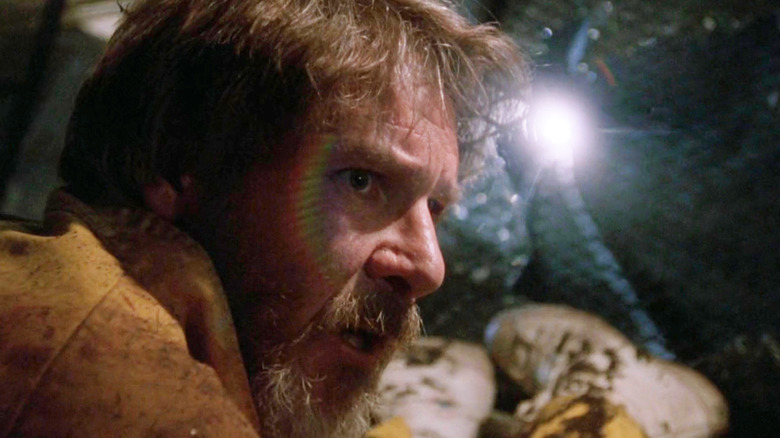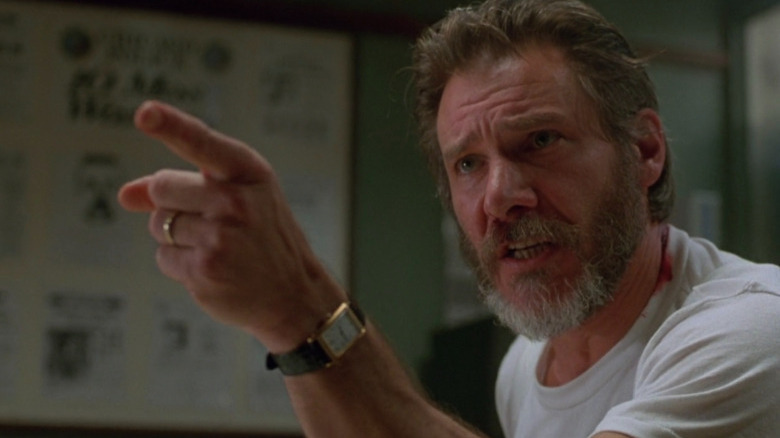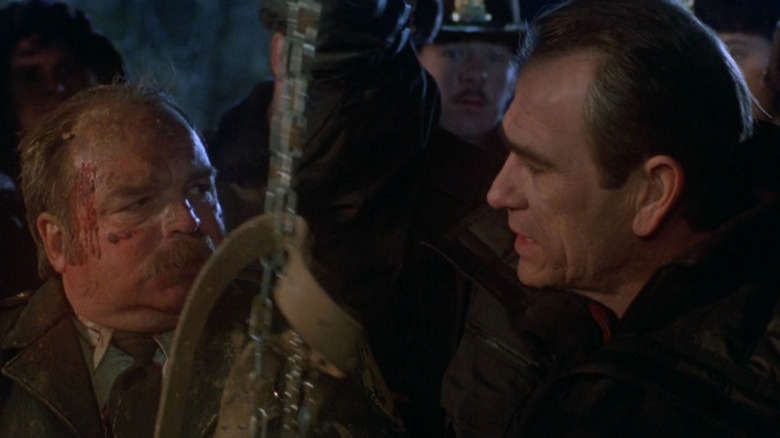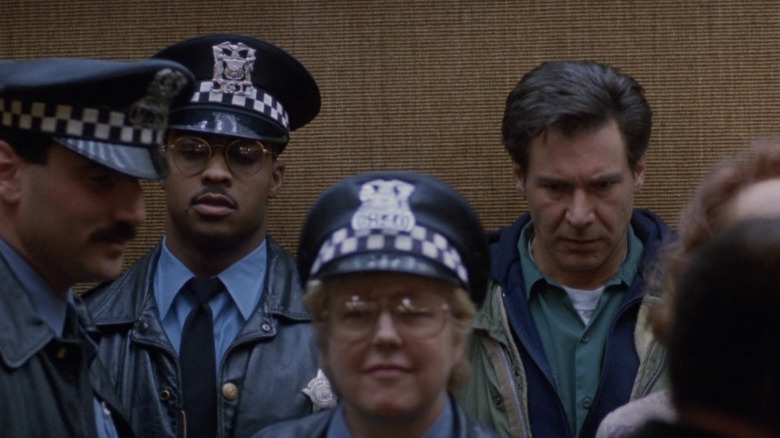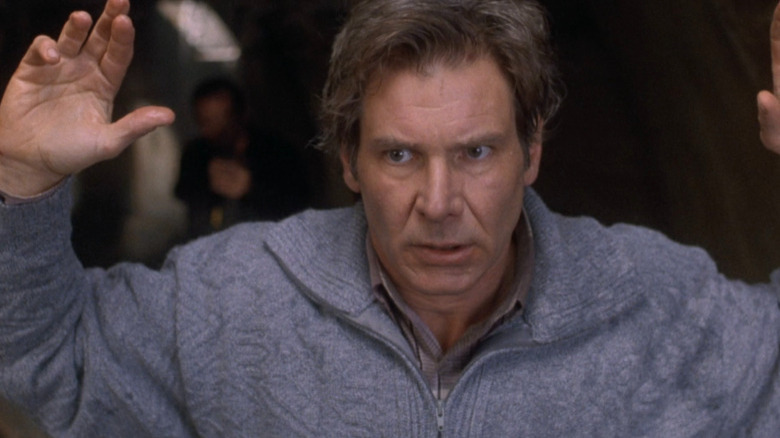The Fugitive Was The Rare Action Movie To Get Nominated For Best Picture – And It Deserved It
In a world where feature film adaptations of hit TV shows are extremely common, a film like Andrew Davis' "The Fugitive" might not look all that unusual, at least at a glance. The 30-year-old film, based on one of the highest-rated television series in history, was a "wrong man" thriller in the classic Hitchcockian mold, starring one of the industry's most successful action heroes, Harrison Ford. It's got a series of thrilling set pieces with epic stunts and derring-do. The director also wasn't a festival darling — he was a genre guy whose biggest claim to fame before "The Fugitive" was two Steven Seagal movies (admittedly, two of the better ones).
"The Fugitive" was financially successful, and even the contemporary reviews were good. But if you haven't seen it — or if you haven't seen it lately — you could be forgiven for wondering why "The Fugitive" wasn't just a hit, but was also nominated for the Academy Award for Best Picture alongside timeless classic dramas like Jane Campion's "The Piano," James Ivory's "The Remains of the Day," and the winner, Steven Spielberg's "Schindler's List." It may not even be abundantly clear why "The Fugitive" was nominated over other acclaimed genre films from 1993 like "Jurassic Park," "The Firm," "In the Line of Fire," and exceptional comedies like "Dave" and "Sleepless in Seattle."
And while there's no accounting for taste, and you could argue that any of those other films would have been worthy nominations (see also: "Orlando," "Philadelphia," "What's Love Got to Do With It," "The Age of Innocence" ... look, 1993 was a very good year for movies), there's at least one reason why "The Fugitive" got singled out by an awards body that rarely nominates action movies.
Even though it's an action movie classic, "The Fugitive" is even better than it gets credit for.
The day the running started
"The Fugitive" stars Harrison Ford as Dr. Richard Kimble, whose wife Helen (Sela Ward) is murdered in the opening credits by a mysterious one-armed man, and who — thanks to circumstantial evidence and the inherent injustices of the American criminal justice system — is promptly convicted and sentenced to execution. While in transit, his prison bus runs off the road and onto a railroad track, and Dr. Richard Kimble (having already been railroaded enough thank you very much) escapes in the wreckage, determined to bring his wife's killer to justice.
The problem is, unlike the incompetent police officers Kimble encounters, Deputy Marshal Sam Gerard (Tommy Lee Jones, who won an Oscar for this performance) is a profoundly skilled and bullish lawman. With a crack team of capable marshals — played by a veritable parade of beloved character actors like Joe Pantoliano, L. Scott Caldwell, and Daniel Roebuck — Gerard is determined to hunt Kimble down, whether the doctor is guilty or not, because that's the deputy marshal's job. And nobody does his job better than Sam Gerard.
"The Fugitive" is based on a TV series that ran for four seasons from 1963 to 1967. It was a monster hit and enormously influential. The series finale helped establish the very concept of having a series finale in the first place, actually wrapping up all of the show's storylines. It was such an event that, as of this writing, it's still one of the highest-rated TV broadcasts ever, with 78 million viewers. That's more than most Super Bowls.
Andrew Davis' film faithfully adapts the show, adding a twist to the mystery's conclusion but capturing the hero's almost self-destructive decency — he can't stop himself from being a good doctor, even if helping someone will probably get him caught — and the show's pervasively paranoid aura. Any moment could suddenly explode into a life-or-death chase, with Gerard hot on Kimble's heels. It often does.
1993: A chase odyssey
On its face, "The Fugitive" is just another film in the "wrong man" genre, popularized by filmmakers like Alfred Hitchcock in classics like "The 39 Steps" and "North By Northwest." But there's more to it than that.
Most "wrong man" movies feature a hero who has been framed for a crime they didn't commit. What makes "The Fugitive" different is that Richard Kimble is the hero, but so is the man trying to catch him. Kimble is right to go on the lam — more on that in a moment — but Gerard is also right to try to apprehend Kimble. Neither man is corrupt or corruptible, and both men are exceptionally smart and good at what they do.
So the irony is, the audience doesn't just want Kimble to evade capture, we also want Gerard to catch him, even though we know we can't have it both ways (at least, not until the film's conclusion). And so "The Fugitive" passes the cleverness torch between Kimble and Gerard throughout the movie: Sometimes Kimble is so smart that Gerard has to play catch-up; sometimes Gerard is so smart that Kimble looks outmatched. Unlike stories where one opposing force is presented as inarguably "bad," the ending doesn't seem like a foregone conclusion. When the protagonist and antagonist are both "the good guys" but they want entirely opposite things, it's trickier to predict who is going to succeed, and how.
Thanks in no small part to the dogged intensity of Tommy Lee Jones and Harrison Ford's overwhelming (albeit often ill-timed) heroics, "The Fugitive" frequently plays less like a blockbuster thriller and more like a modern-day "Les Miserables," if Javert wasn't quite so much of an a-hole. Javert was motivated by his unshakable sense of righteousness. But when Kimble tells Gerard he didn't kill his wife, Gerard replies matter-of-factly: "I don't care!"
Bad cops, whatcha gonna do?
All that helps make "The Fugitive" into a masterful thriller, but if it was just a battle of wits the film might have rung hollow. "The Fugitive" is smarter than that. It uses the framework of a thriller to say something meaningful. Or perhaps — just as likely — in perfecting the framework of the thriller, it illuminates the deeper meaning of the entire "wrong man" genre.
The question any movie about a fugitive has to answer — or at least, any movie about a fugitive who is genuinely innocent — is why do they keep running? As Kimble's lawyer argues, running from the law only makes him look more guilty. So if he's truly innocent, why not turn himself in and pursue an appeal to his case through proper channels?
The answer is because "The Fugitive" argues that, to use common parlance and with the extremely noteworthy exception of Gerard and his team, "all cops are bad." We see in extreme detail just how little effort the Chicago Police are willing to go through in order to search for another killer when they already have a suspect. Prison guards are trigger-happy and quick to take credit for heroic deeds when in the moment they actually demonstrate abject cowardice. Sheriffs initially refuse to do the bare minimum to search for Kimble because they just don't want to deal with phone calls. And it takes Gerard all of two seconds to point out that the only motive the cops could think of for Kimble to kill his wife — money — makes no sense since he's already rich.
At the heart of every "wrong man" thriller is the premise that the legal system has failed. What "The Fugitive" argues, intelligently, intensely, and in practically every scene, is that the failure is systemic. Only when Kimble and Gerard reject the system can justice genuinely be served.
That darned statue
The Academy Awards have a lot of things wrong with them — not least of which is that they were literally invented to prevent filmmakers from unionizing — but they're a big part of Hollywood history nevertheless. Every year, the people who make movies decide which motion pictures they think should be lauded as the industry's and the art form's most historic accomplishments. Sometimes they get it right and sometimes they get it wrong.
But even though the Oscars also have systemic faults, not the least of which is their historical tendency to ignore so-called "genre" films for the top prizes (which they're getting better about, thank goodness), "The Fugitive" managed to work its way into the upper echelons of Hollywood credibility at a time when there were only five nominees for the top prize and the competition was incredibly stiff. Because it's just that good, dang it.
It's not the only action movie to earn the Academy's favor, but until relatively recently Best Picture nominations for action movies — especially action movies that can't also claim to be serious war films (like "Battleground," "The Longest Day," or "Saving Private Ryan") or ambitious historical epics (like "Ben-Hur," "Braveheart," or "Gladiator") — have been exceptionally rare. "The Fugitive" belongs in the ranks of classic action thrillers like "The Adventures of Robin Hood," "Stagecoach," "Star Wars," and "Raiders of the Lost Ark"; action pictures that were nominated for top honors as an exception to the rule (even though they all totally ruled).
